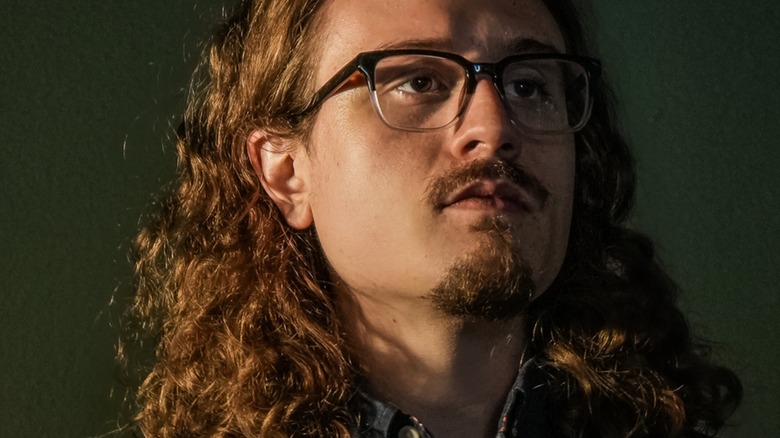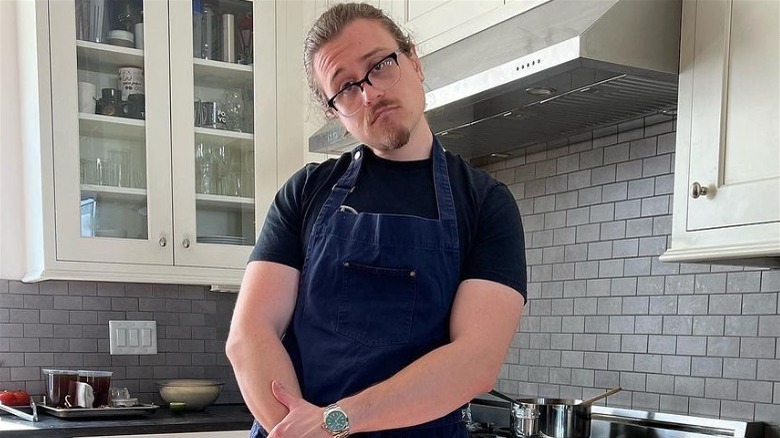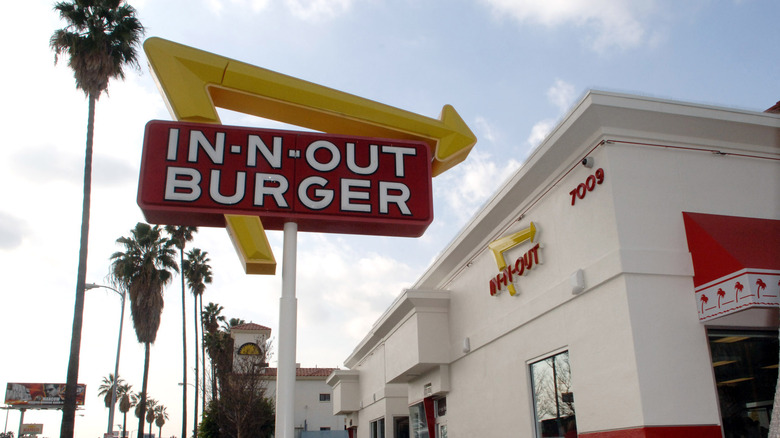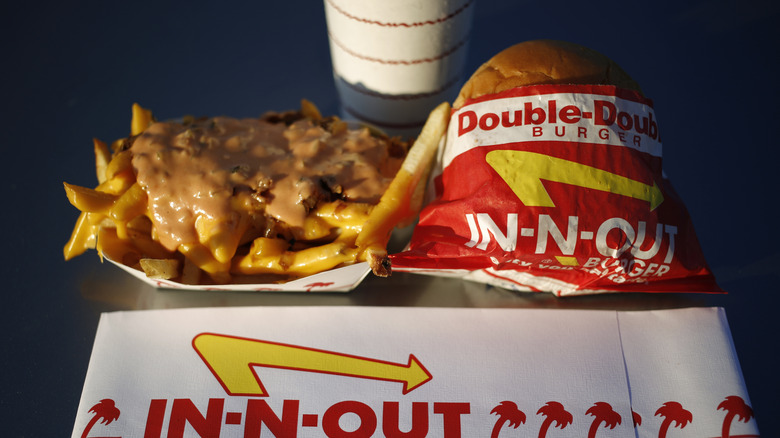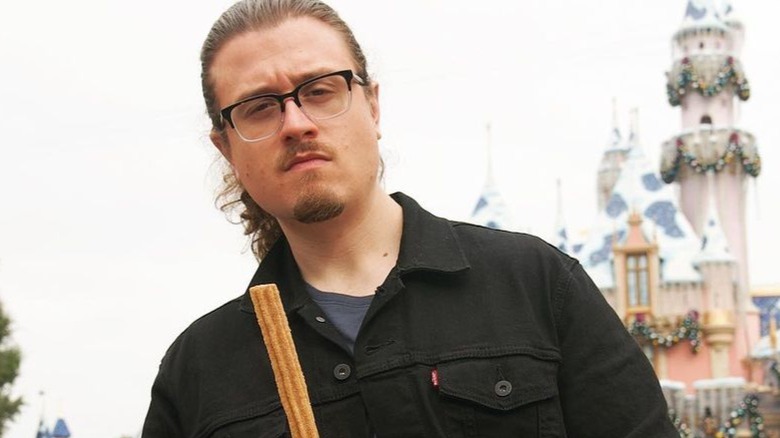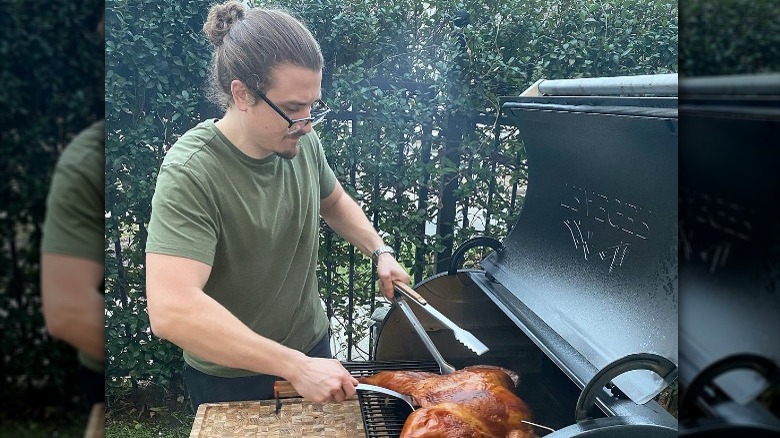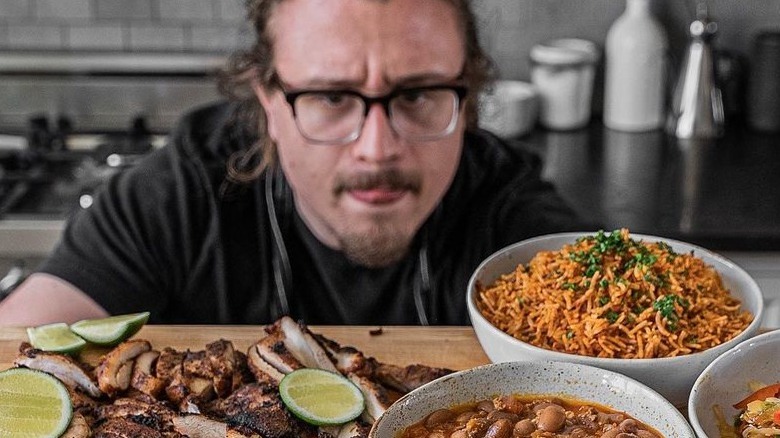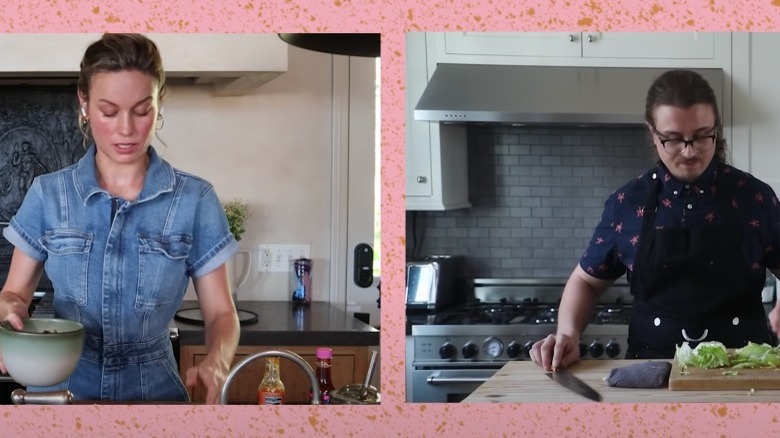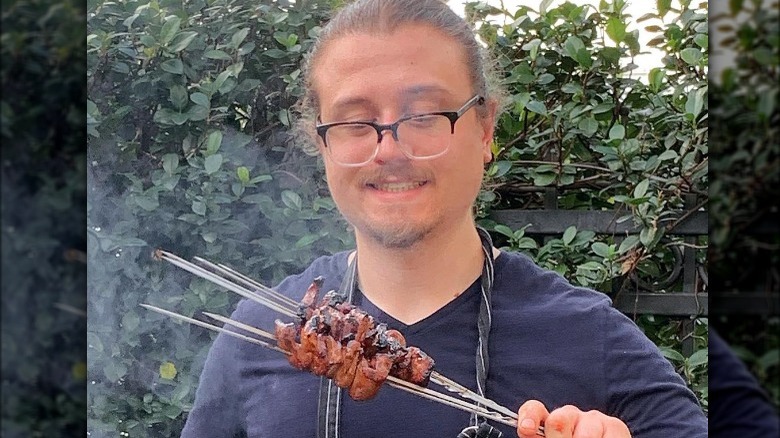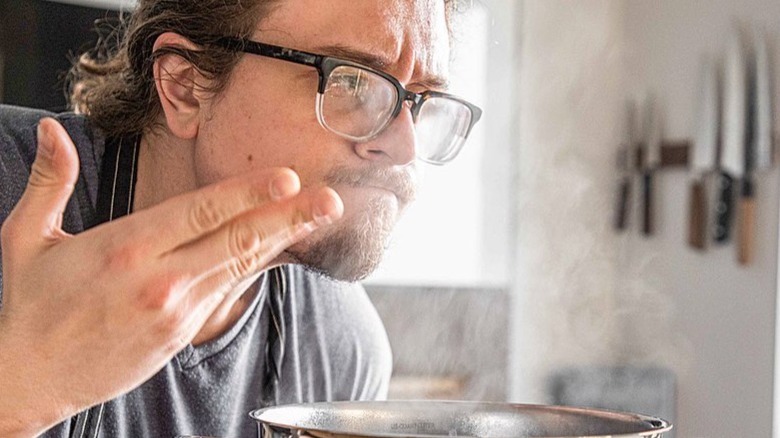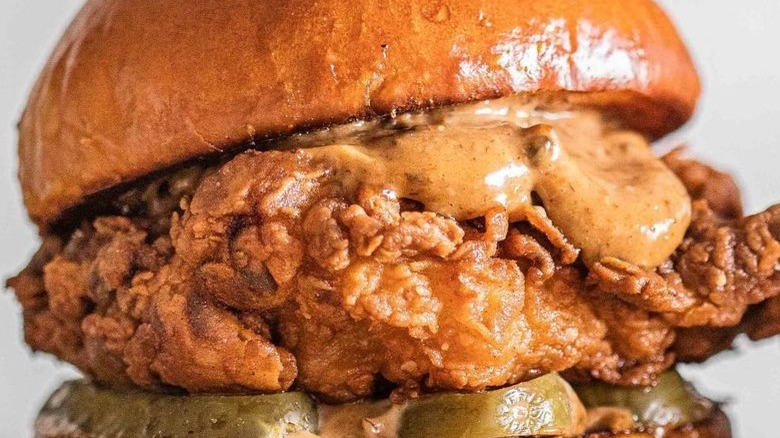Joshua Weissman Hacks In-N-Out, Chick-Fil-A, And Remembers Brie Larson - Exclusive Interview
Food has always been home for Joshua Weissman. The celebrity chef, who has been in the kitchen since he was three years old, cut his teeth in fine-dining at Austin's coveted Uchiko restaurant. He's since made a name for himself on social media doing precisely what social media abhors: making everything the hard way. Weissman may have 5.8 million subscribers on YouTube and 6.1 million followers on TikTok but he's not pandering 25-minute cloud bread, baked oats, or pancake cereal. Instead, Weissman double dares you to take the time and make your chicken sandwich bread and sauce from scratch.
If you've mastered every single recipe to be found in Weissman's 2014 "The Slim Palate Paleo Cookbook," you're in luck. In September 2021, Weissman's New York Times best-selling "An Unapologetic Cookbook" hit the markets, giving you the keys to his kingdom (That'd be everything from hot sauces, ranch dressings, and yes-you-can sourdough starters to chicken fried steaks, tuna melts, and peanut butter cookies). In this exclusive interview with Mashed, Weissman explores his culinary journey, lets us in on the only staples he prefers store-bought, talks cooking with Captain Marvel (aka Brie Larson), and whispers what's next.
The only things Joshua Weissman doesn't make himself
You've made a name for yourself by rejecting all things store-bought, and making things from scratch. Is there anything you have not been able to make yet? Take me to your fridge. Is there anything that you secretly prefer buying?
To answer the first question, no. I don't think I've never come across a single thing that I wasn't able to execute almost identically to what I wanted. I know that maybe comes across as a little bit egotistical. Genuinely, it really comes from a place of the years – I spent my whole life trying to figure out stuff and I've reached this nice apex in my career where I feel like all of the knowledge and repetition has reached a point of mastery where now I understand how to diffuse problems. If I don't understand something, I know how to get over that hump because of all the other past experiences. That's what I'm getting at by saying I've never really run into [something] where I never figured it out. I figured out almost all of them.
I'm sure there will be something that comes up when I open my first restaurant where I'm like, "Ah, I want to do this fancy thing, but can't quite figure it out." Hopefully, there'll be something there because I like challenges.
With the secret ingredients in my fridge, I always have general ingredients. I always have butter, milk, eggs, all the necessities. I will say that on average I usually have about four to eight pounds of butter sitting in my fridge no matter what. I know that seems excessive.
Store bought butter or self-churned?
Store bought, yeah. I would say things that I prefer to buy from the store are those really raw essentials like butter. I guess you could count cream if you really wanted to go crazy and buy raw milk and extract your own cream in a way. I would say butter. Ketchup, I do prefer to buy. I think it tastes better when you make it yourself. Anyone who eats ketchup knows the nostalgia of it. Therefore, you can't have that without Heinz. It's the OG. Ketchup, sriracha, those are probably the top three. Butter, ketchup, sriracha. Oh, and Cholula hot sauce. Most other things I'll make myself though.
I usually have a big jar of [homemade ingredients]. The benefit of making your own ingredients is oftentimes, not all of them, but oftentimes if refrigerated, they last a long time. If you make a hot sauce or you make a ketchup or you make an infused oil, that's going to stay good in your fridge for probably a year.
Joshua Weissman reveals the secret to In-N-Out's sauce
You brought up all these sauces. You're kind of an unnamed sauce king. What is your favorite fast food sauce to make? Can you give our readers a quick and easy sauce recipe that we might be able to replicate?
Yes. As a preface to all of this, I think that sauce is single-handedly the most important element to any food, period. Very underrated, very misunderstood. That being said, my favorite fast food sauce of all time is the In-N-Out spread ... Not just because of flavor or taste, but because of its versatility. It is so good on anything. Put it on a chicken sandwich, put it on a burger, dip your fries in it, dip your onion rings in it. It goes good with everything. It's that nice balance of salty, sweet, acidic. If you want to make it spicy, you can, but it doesn't need to be. It's literally just — and this is the key — everybody knows this combo. Mayo, ketchup, that's the base. Mayo, ketchup.
One cup of mayo, half cup of ketchup. A one-to-two ratio, or two-to-one in that scenario. Two-to-one ratio of ketchup to mayo and then a tablespoon of Worcestershire sauce, one diced dill pickle, salt and pepper to taste, and a half a bunch of chives, very thinly sliced. If you want to add garlic or anything else, you totally can, but that's pretty much the base ... A very important one is one ... onion that's been caramelized, sliced and caramelized really, really deep, like for .... French onion soup. That is essential in the sauce. You can skip the addition of garlic and spices, but you have to have the caramelized onion.
Joshua Weissman's genius In-N-Out fries hack
You avoid eating a lot of fast food yourself these days with the exception of In-N-Out. What's your go-to In-N-Out order?
It depends on how hard I want to go. If I'm starving and I don't care at all, I want to eat and go to sleep, it's going to be a Double-Double with cheese, always cheese. Why would you get a Double-Double without cheese? [That'd be] dry. Double-Double with cheese and then animal-style fries on the side. This is important, a side next to the animal-style fries of another order of fries ordered well done.
In–N-Out fries notoriously are awful, unfortunately. I love In-N-Out for their burgers, not for their fries. I genuinely think In-N-Out produces the worst fries in the entire fast food world. If you get them well done, they're a little bit more crispy. The problem is that they're soft. They're not crispy like they're supposed to be. That's how I would do it, and the reason why I do it that way is you get those crispier fries.
Once your animal-style fries have gone soggy, after about two to three minutes of them sitting there, you then transfer the sauce onto the crispy ones and eat the crispy ones. Then, the soggy ones are there. If you want to do something with the soggy ones and you want to get really gross about it, you can totally add it to your burger and it's good. Just because I've worked in all these fine dining restaurants and I know the techniques and I like to do things fancy doesn't mean you can't eat something dirty, too.
The recipe that had Joshua Weissman stumped
During COVID, you were testing 50 to 60 recipes per week, you said at one point. Which recipe has given you the most trouble so far?
In the book, the most troublesome recipe was ... the cookies. It's a standardized recipe that I've done forever, but I kept trying to mess with some different parameters. How long do I want to chill them? Do I want to change the amount of butter? If there's a lot of fat in a cookie, they tend to be a little more runny and soft. You have to chill them before baking. Otherwise, it's just a puddle, and I kept messing with those parameters.
It's so funny, such a basic concept, but you start messing with those little bits and it completely ruins it. Every recipe took one test and it was good. That recipe took 12, and then it was good. It literally took 12 times longer for a recipe that I've done for probably eight years the same to get it right.
When is it time to stop cooking?
Oh, that's a good point. Well, when you say stop cooking, you mean in a week, in a month, in a year, 10, 20, 30, 40 years? When my back stops working?
When it's a time where you're like, "I need to chill out, take a break, refocus."
You'd be surprised — cooking 50 to 70 hours a week puts me in a spot where when I sit down for dinner, sometimes I'm [like], "I do not want to cook today." It's weird. I have the desire to, but at the same time, I'm looking at the fridge and I'm like, "I've done dishes four times today. I don't want to do another batch of dishes." That's actually what stops me rather than the actual cookery because it's the cooking that I love. On the weekends, sometimes I'm like, "I want to cook for my family or I want to have my parents come over and cook for them," but then I'm [thinking], "But I also don't want to clean so I'm not going to do that," and we go out to a nice restaurant or something.
Joshua Weissman talks the restaurant world
You are so well-established now. You've made a name for yourself across all social media channels. Between the time you published your first book and you rededicated yourself to social media, you worked for a few years at Uchiko. Before that, you were in other restaurants, and you had mentioned that you got fired from one of them. What happened there?
It was one of the first restaurants that I worked in. The restaurants prior were ... I was young. I didn't know what restaurants I wanted to go to. There were the really high, fine dining ones. At the time, I knew I had the gumption and the ability, but I was like, "Maybe I'll start easier and then work my way up. That way I have past experiences so I know I'll get the job at these other places." That was my thought process. I worked at a couple of them, and ... unfortunately, I would work for a couple weeks and then be like, "Nope, don't like it," and go to another restaurant.
[I would] work for a couple weeks, [go] "Nope, don't like it," [and] go to another restaurant. I won't name the restaurant, but I found this one restaurant and it was a very well-known place in Austin. I loved the food that they were doing. I thought it was nice. I tried to get a job and they didn't want to give me a job because I didn't have really a ton of past experiences that were longer than two weeks. I had maybe six restaurants, but each one was one to two weeks of jumping back and forth. Prior to that, I was doing recipe development for magazines and stuff like that because I wasn't able to work in restaurants. This was when I was 17, 18 years old. I worked there as a stagiaire, which is basically a free intern, for a month.
Then they gave me a job when there was an opening. Some guy kept not showing up and I was like, "Well, I'll show up." I would literally get up at 3:00 AM and drive all the way over there. Because I would sometimes be in San Marcos, which is almost an hour long drive from the restaurant. I would wake up, they would call me at 3:00 AM and be like, "Yo, he didn't show up. Can you come in?" I'd be like, "Yeah." I would just get up at 3:00 AM, drive there, and show up. It was great.
How Joshua Weissman got fired
Then what happened?
The first few months were tough because it was a different style of restaurant than I was used to. I had the technique, but it was the working in a fine-dining restaurant that I needed to learn. Almost every cook I know has to learn that. It's very different, very astringent.
There are no mistakes, and they don't take no for an answer. Everything must be perfect. That took me a bit to learn. I finally started to get the hang of it and I felt like nobody liked me there. I felt unwelcome and I was unable to make friends there. No one would talk to me and collaborate with me. There was a day where they moved me to this one line position and I think it pissed some people off. I could tell they were angry and then one day they were like, "You're done." And I was like, "Wait, what did I do?" And they were like, "I don't know." Who knows what went into that? I think part of it was the idea of me being newer and also being in a slightly higher position and it made some people upset. I think that's probably how it went. Honestly, it was probably for the better because it made me question a lot of things.
I think that could have been a very pivotal moment, had I chosen to go another route after that. I think a lot of people get fired and it totally crushes you, especially if it's a creative passion-driven thing. It totally crushed me, [but I] picked myself up. I was like, "Well, if I'm going to do this, I'm going to go to the best restaurants I possibly can and beat myself into a pulp until I get what I — let me find out if I'm good at this or not." I started pursuing better restaurants and ... acquiring more knowledge and got more used to the environment and eventually, it became normal for me.
The time Joshua Weissman cooked with Brie Larson
Now you're cooking on YouTube with Brie Larson. Tell us about that. She had a very big zucchini –
Yeah, she did. I was very proud of her. I noticed she was very, very proud of her zucchini, which is, I would be proud of it too if I had a zucchini that big. I wish I did. I've been trying to grow my own vegetables and nine times out of ten, they die. I can cook. I can't grow food, though. Yeah, she was great. Brie Larson is amazing, super sweet. She still keeps in touch with me. We still chat from time to time, which is great to see. Sometimes, when you wrap a shoot with somebody that's higher up, sometimes they never hit you back up again. They wanted to do a little thing and never speak again, which is cool. I get that, but Brie Larson's been great. I'm a big fan of hers.
And how did that colab come about?
I think a friend of a friend knew her and knew she wanted to get into food. Somehow, we got connected and managers did their management thing and got us connected. We had a pre-call where I was like, "Well, here's my idea." She said she wanted to do a crunch wrap, but vegetarian. I was like, "Let's do it. That's a great idea." We literally just did it.
The secret to learning to cook according to Joshua Weissman
You often urge people to not be afraid of certain cooking techniques or certain recipes that are notoriously hard. What are the things that you found people are most afraid of taking on?
I think people are most afraid of time commitments. Anything that takes either time commitments or things that visually look difficult. It's one of the two, usually both, but one of the two. If it's time, they're worried that they're going to take all this time and it's not going to come out right. Iif it's a visual thing, like the way I brunoise an onion, brunoise is a very, very small dice. We're talking slightly larger than a granule of sugar. We're talking very small, but perfect squares. That kind of technique scares people because they're like, "Oh, what if I cut myself?"
I've trained a lot of different people in restaurants. I've trained hundreds of different cooks. I've trained people who couldn't cook at all [who], if I'm being honest, were horrible. I've trained people who are really advanced. It's funny, they all eventually converge and meet with enough repetition. That's the beauty of it. If you do the repetitions, you will get good at it. You will. I don't really believe in the whole, "Well, there are people who can't cook." Not true. There are people who don't want to cook and that's totally cool. I respect that, but you've got to call it what it is.
Okay. You're calling a lot of readers out there probably.
That's cool. Hey, call it what it is. It's okay. You have my blessing to call it what it is. It's okay to live in that world.
Joshua Weissman teaches us how to cook a perfect steak
You've previously said one of your favorite personal things to cook when you're not inventing something for social media is a steak. What's your number one tip when cooking steaks?
Make sure your steak is thick enough. I keep seeing this happen where people ... get a steak that's three quarter inch or [a] half inch. That's too thin, unless you're planning on doing something else with it. Maybe you chop it up and marinate it and make, I don't know, Kalbi, or a marinated beef stir fry or something. That's fine because you're going to cook it well done anyway, but if you're looking for a nicely cooked medium rare steak and you don't want to have a hard time trying to get it to medium rare, then get a steak that's at least one to one-and-a-half inches thick, ideally in between those two numbers. Because it's a lot harder to overcook it that way.
Okay, follow up. Why medium rare?
Multiple reasons. Texture, juiciness, maximized flavor. Those are the top three. When you cook a steak to well done, you lose 60 to 70% of its original flavor because all the juices [are gone] ... Texturally, [a well-done steak is] more tough and it's drier and overall [the] experience [is] no good. I will say one thing about a well-done steak and this is something, this is a hot take. I'm not sure that everyone will agree with me, but the masters out there, a true master in cooking will understand this. It depends also on the fat-to-meat ratio of the beef. If you have, and this is a deadly sin, but if you have something that's marbled like Wagyu and you were to cook it to medium, that might be okay because its fat-to-meat ratio will sustain the texture. It'll sustain the flavor, it'll sustain the juiciness. It won't quite kill the steak like you would with maybe a prime steak.
If you have a tougher steak like shoulder cap, that's actually better texturally if you cook it medium because its intramuscular fiber is more broken down because it's reached a hotter temperature internally. If you served it rare, it would be much chewier, because again, intramuscular fibers.
This is our last steak-related question. Can you really cook a steak in a toaster?
I would never do that. I would rather go to jail, but probably you can. It would be horrible and, also, I'm pretty sure that's a fire hazard. I saw that TikTok and I don't know how her apartment is still up and standing.
How to win the chicken sandwich wars
Your most popular YouTube video to date is how to make a Popeye's chicken sandwich at home. It's got over 10 million views. Can you give our audience your tips for making a chicken sandwich that's going to beat out any of the ones currently circulating the market?
Yes. The first point roots back to my previous answer, which is sauce. You've got to have a good go-to sauce that you feel good about, a nice chicken sauce, whatever that is. I think ... that mayo-based sauce I told you about, something like that would work great on a sandwich like that. The second thing is buns. That is where so many sandwiches go wrong. Everyone overlooks the bun. They're so focused on what's inside the bun and then they just go buy buns, but it's like, wait a minute. You're missing literally, you're ignoring 50% of the eating experience, which is the bun. That's 50 to 60% of the sandwich. I would argue that's possibly just as important as anything else on the sandwich.
The third is how you season the chicken. You've got to season, when you fry it, and you've got your seasoned flour and your seasoned buttermilk, you should always put more salt than you think you need. There's nothing worse than under-salted fried chicken. One of the reasons why people like KFC, people like Chick-fil-A, people like Popeye's, isn't just because it's fried chicken. It's because they go hard on the salt. It needs a lot of salt to really sustain the flavor. Because flour has no seasoning or flavor at all really when you fry it.
It's funny you say that. We get so many comments on the importance of salting food right.
It's huge. It's so important. I honestly think that is the number one reason why any eating experience goes wrong is because the food was not seasoned properly. You can slightly overcook something, but salt it and season it beautifully and it's still quite nice. You could cook something absolutely perfectly, the juiciest chicken breast of all time, but with no salt, that's a flop right there.
What's the single most important ingredient for you? The one ingredient that you can't live without.
Ooh, probably salt, on that note, now that I'm thinking about it. If I wasn't thinking about salt, I might have said butter.
What's next for Joshua Weissman?
Is there a chef that you want to cook for you?
It would be in between two different chefs. I would like to cook with them, collaborate, cook a meal together. Either Gordon Ramsay or Rene Redzepi of Noma, one of those two guys, [who were] huge influences on my life. When I was in restaurants, I used to watch both of them all the time and look at what they're doing. It always inspired the dishes that I was putting on the menu, and some people might have called me out and been like, "I'm pretty sure I saw something similar on Rene Redzepi's Instagram. Josh, that sauce looks pretty similar." I'm like, "Yeah, dude, it is similar because he inspired me." At the same token, I will admit, I put up a couple plates that were inspired by Rene.
You've been in the public eye now for quite some time. What advice would you give to your teenage self who rocketed into the public eye after publishing "The Slim Palate Paleo Cookbook"?
At that age, I would advise myself to stop trying to control absolutely everything, and instead, focus on each footstep in front of you, instead of everything at once.
And what's next for you now?
A lot of things. I'm working on my second book and we're going to launch my first restaurant, which I'm very excited about. That has quite a timeline to it because as many people probably know, it takes some time to get everything set up, get the land and all that stuff. We are going to launch a restaurant and there's more that I probably shouldn't say. I can give a rough implication that there might be something happening outside of YouTube that is also a show that isn't on the internet.
That's really exciting.
Yeah. We're firing on all cylinders here. It's good stuff.
What to look forward to in Joshua Weissman's first restaurant
For your restaurant, can you give me a concept, a picture of what we might be looking forward to?
I can give a little bit. It might change a little, so that would be the caveat, It'll be a restaurant where anyone can come in and have a real experience. It's not necessarily going to be, "You've got to have your suit and tie and it's got to be super, super expensive." You can come in and spend 50 bucks a person and have an amazing experience. That's what I'm looking to do. I want to appeal to the masses so that anyone can have access to having a great meal experience, not just high rollers who are trying to spend $500 a person.
And this is going to be Austin-based?
It will probably be Austin-based. I would say 99% chance, although the only reason I say 99% chance is because Austin real estate is a bloodbath nightmare. Anyone who's looked at any real estate in Austin knows that it is probably the worst in America right now, so "Go me!" for picking Austin.
Want more from Joshua Weissman? You can purchase his New York Times best-selling cookbook, "An Unapologetic Cookbook," here.
